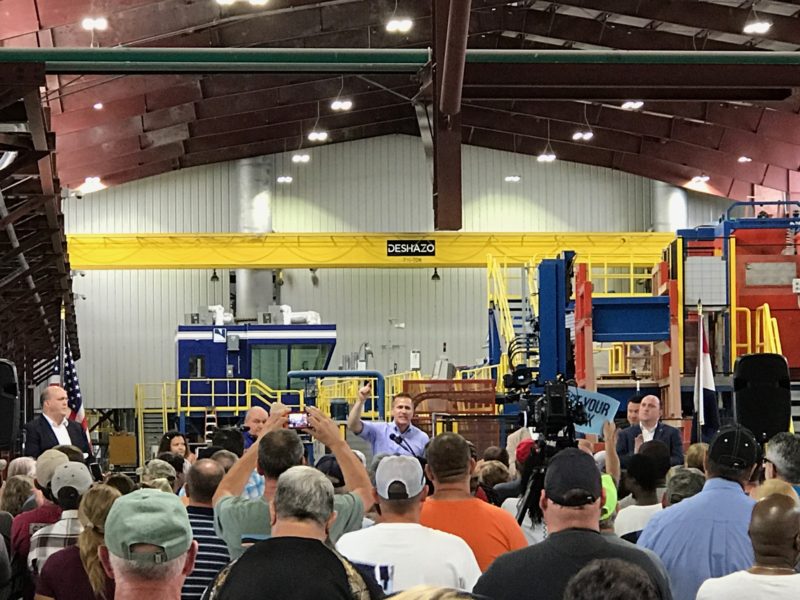JEFFERSON CITY, Mo. – A collective sigh of relief could be heard last Friday as the extraordinary session wrapped up in the State Capitol, allowing lawmakers, lobbyists and other interested parties to head home for the Memorial Day Weekend.
With the Senate and House both signing off on HB 1, a bill that would allow the Missouri Public Service Commission to offer a special rate to steel mills, aluminum smelters and other large consumers of electricity, the next step requires simply the signature of Gov. Eric Greitens.
But that’s where the real work begins. The legislation passed last week only gives the PSC the authority to give out special rates, but does not actually set any agreements in place.
In effect, it just untied the PSC’s hands in the matter, allowing them to get to work as quickly as they can. But, for the goals behind the passage HB 1, particularly the restarting of the old Noranda aluminum smelter and the creation of a new steel mill in New Madrid, to truly begin, it must begin the ratemaking process with the PSC.
To do this, the companies and utilities that would be involved in such a deal must first file an application with the PSC, which isn’t as simple as just filling out a form.
Starting the process
First, the question is who will file the application.
“The way the legislation is written, it depends on whether it’s a customer or facility that is currently in an electrical corporation’s territory or outside of it,” Natelle Dietrich, director of PSC staff, said. “If it is inside a territory, the electric company would file an application. If it’s a company that is outside of an electrical company’s service territory then the facility would file the application.”
“There’s a predecessor step to that, which is the development of the application and the potential tariff end or contracts,” Warren Wood, Ameren’s vice president of external affairs, said. “We have to work with – this is Ameren Missouri, and the expectation is that we would be the electric service provider – and we need to have conversations with the smelter operators, both the aluminum and steel. We have had some of those conversations, and we’re looking forward to getting back into those discussions now that the special session passed legislation.
Wood said they have also met with the PSC staff a couple of times to talk about what the potential operators would look like and the range that might be requested, in order to give them time to start thinking about everything before the application is submitted.
Dietrich and Wood both say the bill lays out things that the commission would have to consider in regard to giving a special rate:
- Impact on the state
- Operation able to start with or without the special rate
- The effect on other ratepayers
- Conditions the PSC might want to impose
- What the rate is
- How long the company is asking for the special rate
- Any intervenors
Wood says that the application of Magnitude 7 could be filed sooner than that of the steel mill, as the facilities and groundwork are already in place for their operations, thanks to the old Noranda smelter.
He also said that part of the work that would need to be done is establishing how the power will reach the facilities. In the case of Magnitude 7, the necessary components, for the most part, are already in place, so Wood said that Ameren would just need access to the lines to reach the site. That just requires a deal between Ameren and the owner of the transmission lines.
The case of the steel mill, however, may take more time, since power lines and more may need to be put up to reach the proposed site.
How a rate case works
Before any hearings ever happen, the PSC’s staff of engineers, accountants, and auditors will investigate and review the company’s books and records, which can sometimes take months to complete.
During that time, the PSC also takes recommendations from other parties, like the Office of Public Counsel, as well as consumer groups and industrial customers in regard to the rate change, and allow for applications of intervention. An intervenor can also request a hearing in the rate case.
Once that has been completed, the PSC would set a procedural schedule in the case, which begins with a pre-hearing conference in which the issues of the case are discussed.
According to the PSC’s website, ratemaking is a two-step process.
The first step is determining the “revenue requirement,” or the amount of money the utility should collect from customers each year. That determination is focused on four factors:
(1) the company’s reasonable and prudent operating expenses
(2) the total investment or “rate base” upon which a return may be earned
(3) the accumulated and ongoing depreciation of plant and equipment
(4) the “rate of return” or profit the utility has an opportunity to earn.
The second part of the equation is for the PSC to design rates that will collect the required revenue from the utility’s residential, commercial, and industrial classes of customers.
In some cases, the PSC will conduct local public hearings to hear from the citizens affected by the proposal.
If an agreement cannot be reached in a rate case between the involved parties, then formal evidentiary hearings are held.
At these hearings, the utility must demonstrate that its request is reasonable. Testimony addressing the issues of the case is prepared and presented along with exhibits, and a court reporter records all of the proceedings. In most cases, the utility, the PSC staff, Office of Public Counsel and any intervenors will present testimony in writing, followed by cross-examination, just like lawyers would in a trial in court.
After that, the five commissioners will read the testimony, review records and briefs, question witnesses and consider all of the evidence presented before them in order to come to a decision.
The PSC only authorizes rate changes that are reasonable and just, as required by law to ensure fairness in the industry for both the companies and the ratepayers and is in the best interest of the public.
Typically, when a utility company files for a rate case, the PSC usually has 11 months from the day of the filing to make a decision. In this situation, however, that is unclear.
“Until there’s actually an application, there’s really no way to know because we don’t know what they would ask for,” Dietrich said. “We just don’t have any real idea at this point. The legislation does not have any time frame in it as far as a commission decision or any kind of action, there really is no statutory deadline.”
Which is an interesting thing to consider, as the reason for the extraordinary session was that Gov. Greitens and lawmakers in support of the bill felt this legislation could not wait until the next legislative session.
It stands to reason that once the applications are filed, the process could move quickly, as it was moved through the General Assembly.
But in the end, it will be more of a scenario in which they have to play it by ear, and basically, treat is as they do other rate cases as they work to establish the parameters of the new law.
Benjamin Peters was a reporter for The Missouri Times and Missouri Times Magazine and also produced the #MoLeg Podcast. He joined The Missouri Times in 2016 after working as a sports editor and TV news producer in mid-Missouri. Benjamin is a graduate of Missouri State University in Springfield.









